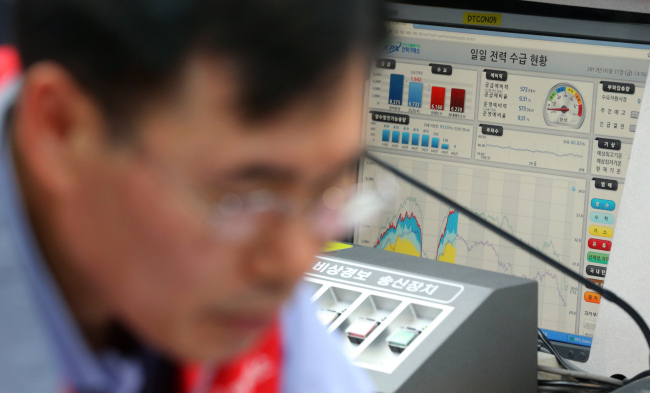Nation faces warning on electricity supply this week
By Korea HeraldPublished : June 2, 2013 - 20:49

With another nuclear reactor to stop for maintenance and an expected power demand increase because of high temperatures, the nation’s electric power reserves are expected to drop to a warning level this week, officials said Sunday.
The projected shortage will greatly concern industrial circles, especially the sectors heavily reliant on electricity for production.
According to the Korea Power Exchange, the country’s total electricity inventory will come close to 3 million kilowatts this week and fall to 2.5 million kilowatts the following week.
This is to activate two warning steps consecutively, based on a phased warning system which is to be issued for every 1 million kilowatts decrease, starting from the 4 million kilowatts line.
The Nuclear Safety & Security Commission suddenly halted last week the operation of two nuclear reactors because of control cables with forged quality warranties. Two other reactors, which were scheduled to resume operation within the year, were also suspended.
According to the Korea Hydro and Nuclear Power Co., the operation rate of the nuclear power plants has decreased to under 80 percent for the first time.
The expected supply shortage poses a threat to industries with large-sized manufacturing facilities here, especially those that are heavily reliant on electricity supplies.
Hyundai Steel and Samsung Electronics, the nation’s top two consumers of electricity, have come up with emergency action plans to prevent total power exhaustion and to meet their export demands.
“While the steel industry generally requires a high supply of electricity, the problem is all the more serious for us as we specialize in electric furnaces,” said an official of Hyundai Steel.
The company thus decided to partly suspend its facilities during the summer season and adjust its quarterly target output, the official said.
Samsung Electronics also set to reinforcing its energy saving campaign, obligating its factories to cut down on their power during peak time and to replace time-worn facilities with new high-efficiency ones.
The production of key export items such as semiconductors and display items, however, will be maintained at the usual capacity level, according to officials.
Despite such individual efforts, the burden on manufacturing is expected to have a negative effect on the entire market.
“Electricity is one of the key raw materials, which determine the competitiveness of all basic industries, such as steel, semiconductors and heavy industries,” said an official of the Federation of Korean Industries.
“The inflation in the industrial market, in turn, will result in the price hike in the consumer market.”
The worst scenario nevertheless is the possibility of a total blackout, which should be avoided at all costs, the official added.
Back in 2011, when an extensive blackout hit on the Yeosu Industrial Complex, some 26 petrochemical companies suffered a total loss of 70 billion won ($61.9 million).
By Bae Hyun-jung (tellme@heraldcorp.com)
The projected shortage will greatly concern industrial circles, especially the sectors heavily reliant on electricity for production.
According to the Korea Power Exchange, the country’s total electricity inventory will come close to 3 million kilowatts this week and fall to 2.5 million kilowatts the following week.
This is to activate two warning steps consecutively, based on a phased warning system which is to be issued for every 1 million kilowatts decrease, starting from the 4 million kilowatts line.
The Nuclear Safety & Security Commission suddenly halted last week the operation of two nuclear reactors because of control cables with forged quality warranties. Two other reactors, which were scheduled to resume operation within the year, were also suspended.
According to the Korea Hydro and Nuclear Power Co., the operation rate of the nuclear power plants has decreased to under 80 percent for the first time.
The expected supply shortage poses a threat to industries with large-sized manufacturing facilities here, especially those that are heavily reliant on electricity supplies.
Hyundai Steel and Samsung Electronics, the nation’s top two consumers of electricity, have come up with emergency action plans to prevent total power exhaustion and to meet their export demands.
“While the steel industry generally requires a high supply of electricity, the problem is all the more serious for us as we specialize in electric furnaces,” said an official of Hyundai Steel.
The company thus decided to partly suspend its facilities during the summer season and adjust its quarterly target output, the official said.
Samsung Electronics also set to reinforcing its energy saving campaign, obligating its factories to cut down on their power during peak time and to replace time-worn facilities with new high-efficiency ones.
The production of key export items such as semiconductors and display items, however, will be maintained at the usual capacity level, according to officials.
Despite such individual efforts, the burden on manufacturing is expected to have a negative effect on the entire market.
“Electricity is one of the key raw materials, which determine the competitiveness of all basic industries, such as steel, semiconductors and heavy industries,” said an official of the Federation of Korean Industries.
“The inflation in the industrial market, in turn, will result in the price hike in the consumer market.”
The worst scenario nevertheless is the possibility of a total blackout, which should be avoided at all costs, the official added.
Back in 2011, when an extensive blackout hit on the Yeosu Industrial Complex, some 26 petrochemical companies suffered a total loss of 70 billion won ($61.9 million).
By Bae Hyun-jung (tellme@heraldcorp.com)
-
Articles by Korea Herald








![[KH Explains] Hyundai-backed Motional’s struggles deepen as Tesla eyes August robotaxi debut](http://res.heraldm.com/phpwas/restmb_idxmake.php?idx=644&simg=/content/image/2024/05/16/20240516050605_0.jpg&u=20240516155018)










